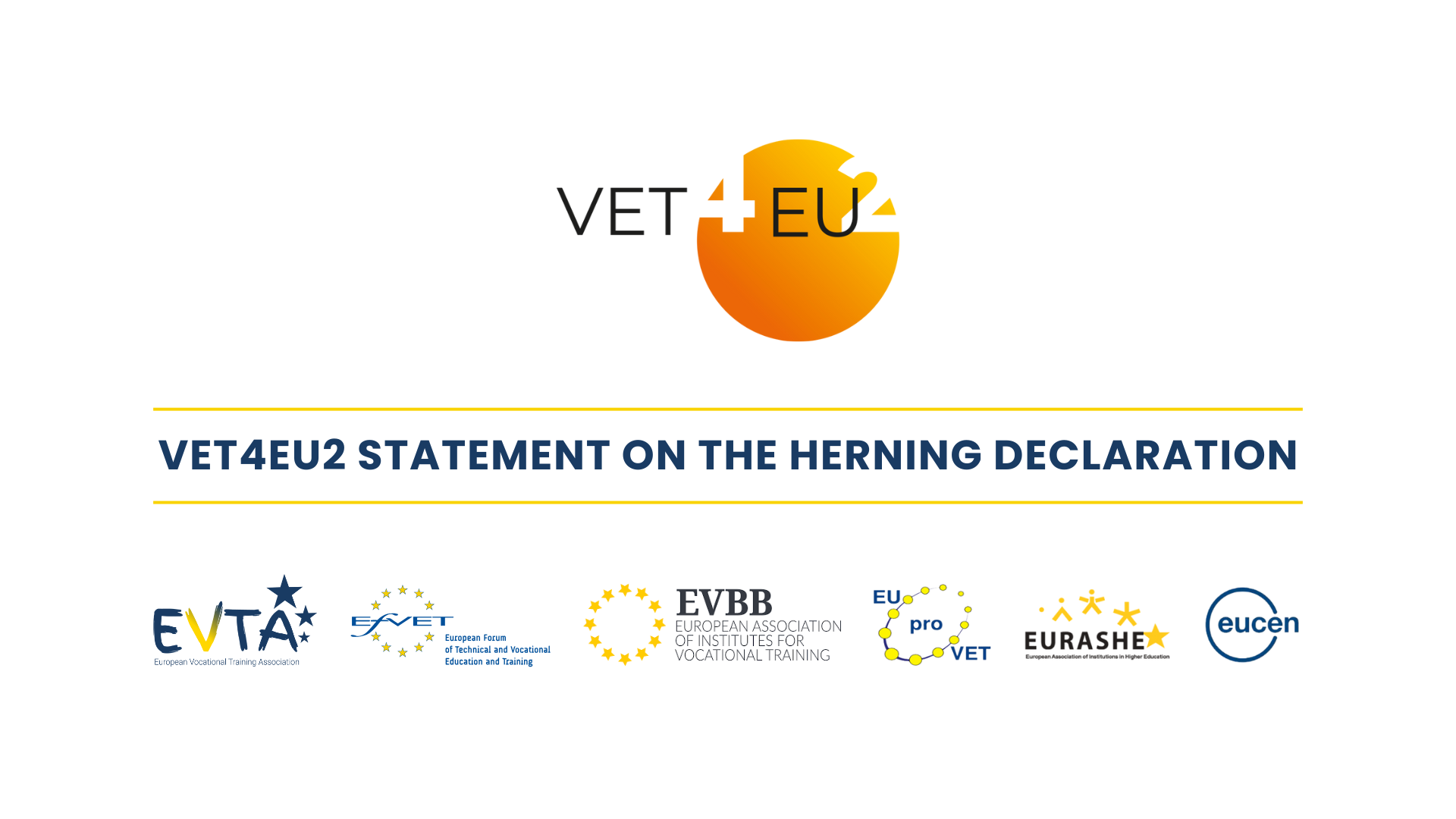A renewed commitment to inclusive and excellent VET for the future
As VET4U2 – the joint platform of six European associations representing vocational education and training (VET) providers across Europe – we welcome the Herning Declaration on Attractive and Inclusive Vocational Education and Training for Increased Competitiveness and Quality Jobs 2026–2030. We fully endorse its reaffirmation of the Osnabrück Declaration (2020), and its commitment to resilience, digital and green transitions, and inclusive excellence in VET. We particularly value the Herning Declaration’s alignment with recent EU strategies such as the Council Recommendations on digital education, learning mobility and skills, the European Year of Skills, and the Union of Skills. These policy links make the Herning Declaration an important continuation and update of the Copenhagen process in the evolving European context.
Recognising progress and new priorities
VET4U2 supports the Declaration’s strategic shift from post-COVID recovery to future-oriented competitiveness and technological readiness, including responsible use of AI, immersive technologies, and advanced digital tools. We also appreciate the recognition of teacher shortages, the expansion of Centres of Vocational Excellence (CoVEs), and the continued emphasis on inclusive mobility and stakeholder engagement. Moreover, we welcome the reference to our role as European-level VET providers’ associations, and our commitment to the implementation of this Declaration. As such, we are ready to contribute proactively through our member networks in over 30 countries.
Enhancing implementation through inclusive cooperation
While the Herning Declaration sets a solid direction for the next phase of VET development in Europe, we believe there are opportunities to build on this foundation through continued dialogue and deepened collaboration between policymakers, providers, and stakeholders.
- Building on Osnabrück progress: To support long-term impact, it could be helpful to reflect more systematically on the progress and experiences gained during the Osnabrück Declaration period. A shared understanding of what has worked well – and where challenges remain – can guide more balanced and effective implementation across Member States.
- Strengthening participatory governance: We welcome the emphasis on stakeholder involvement and would suggest exploring structured ways to enhance the participation of learner organisations, teachers’ unions, and VET providers in governance processes – for instance, through advisory groups, stakeholder councils, or regular consultations on funding and strategic priorities.
- Promoting meaningful inclusion and societal impact: The Declaration’s focus on access and participation is highly appreciated. Going forward, continued attention to qualitative dimensions of inclusion – such as culturally responsive pedagogy, learner voice, and learning outcomes – may further support VET’s role in driving employment, social cohesion, and sustainability.
- Tackling the VET workforce challenge: Addressing teacher and trainer shortages remains a shared concern. In addition to improving the attractiveness of the profession, exploring innovative models such as international talent sharing, virtual mobility, or new support structures for professional development could be considered.
- Strengthening Higher VET and micro-credentials: We welcome the focus on expanding higher-level VET pathways (EQF 6–8). To support parity of esteem, ensuring alignment in quality assurance mechanisms with higher education standards can foster mobility and recognition across education sectors. Including micro-credentials more explicitly could also enhance flexibility and accessibility in lifelong learning.
- Scaling Centres of Vocational Excellence (CoVEs): The continued investment in CoVEs is a highly positive step. We encourage their further development as inclusive ecosystems that foster innovation, regional development, and international collaboration. Sustaining and scaling their impact will benefit from strong VET provider involvement, long-term resourcing, and integration into both national and EU strategies. From the Member states, we expect a recognition of the CoVEs approved by the Commission as key players, also at the national level.
As a platform of leading VET associations, we will:
- Promote grassroots implementation of the Herning Declaration through our networks at national and regional levels.
- Facilitate cross-country cooperation on digital transformation, green skills, and inclusive excellence, particularly through Erasmus+.
- Advocate for balanced monitoring and progress assessment by the European Commission and Cedefop, ensuring equity across EU and candidate countries.
- Support policy dialogue between VET providers, national policy makers, and EU institutions to help co-create the future of VET in Europe.
The Herning Declaration offers a solid and timely framework for advancing VET in Europe. It reflects the lessons of recent years and outlines relevant goals for the decade ahead. VET4U2 encourages a continued and constructive partnership between Member States, EU institutions, and VET providers to ensure that ambitions translate into tangible progress – for learners, societies, and the labour market.
We, members of the VET4EU2, are committed to making VET an engine of inclusion, innovation, and sustainability in Europe and beyond.
To complement this statement, VET4EU2 has also prepared an Action Plan that brings together a list of suggested actions to support the implementation of the Herning Declaration during the period 2026–2030. These actions outline how VET4EU2 will contribute to this process, guiding and supporting the wider VET community in moving forward. Read the full Action Plan below.

